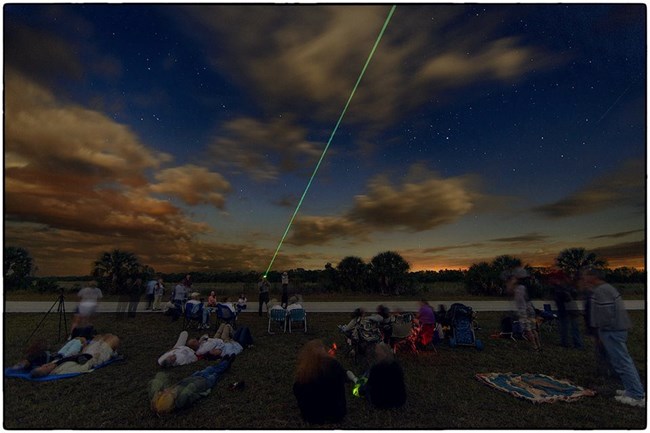
NPS Photo Join us for an evening of dark sky education and celebration! View one of the darkest night skies in the eastern United States by attending a ranger-led astronomy program at Big Cypress National Preserve this winter! Winter 2025-2026 SchedulePrograms will be held once per month in December, January, February, and March. The programs will take place at the end of Seagrape Drive located on the east side of the Nathaniel P. Reed Visitor Center, 33000 Tamiami Trail E, Ochopee, FL 34141. The following dates have been scheduled for programs open to the public: Where?Programs will be conducted at the southern end of Seagrape Drive, where the Nathaniel P. Reed Visitor Center is located (east of SR 29, between MM73 and 74 on US41).Nathaniel P. Reed Visitor Center 33000 Tamiami Trail East Ochopee, FL 34141 Special ConsiderationsOutdoor seating will not be available during the interpretive program, telescope viewing, and constellation tours. Visitors are encouraged to bring lawn chairs or blankets if seating is desired. Night temperatures can be cool and mosquitoes may be present. Visitors should be prepared for weather conditions.Presentations may be conducted in the Nathaniel P. Reed Visitor Center auditorium if weather prevents night sky viewing. As space is limited inside the visitor center auditorium, seating will be available on a first come, first served basis. Please leave all furry friends at home for the night sky programs. This is for the safety of your pet and others. Pants, long sleeve shirts or jackets, and bug spray are recommended. Please no white flashlights as it affects our night vision. Only flashlights with red lenses will be allowed. Individuals and local astronomy societies are welcome to bring personal binoculars and telescopes.

Why Dark Skies?Dark skies are essential natural, scientific, cultural, and economic resources. National park sites, including Big Cypress National Preserve, are home to some of the last remaining dark skies in the country and are committed to protecting the night sky resource.Learn more about the importance of natural dark sky and how to minimize light pollution.
|
Last updated: December 23, 2025
